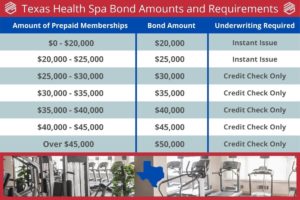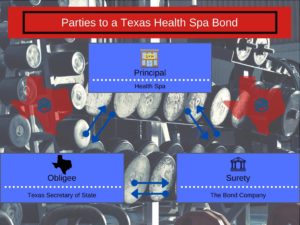Health Spas in Texas need to be registered and they need to provide security to protect the public, such as a Texas Health Spa Surety Bond.
Who Needs a Texas Health Spa Bond?
Title 3 Chapter 702 of the Texas Occupation Code is also known as the Health Spa Code. The Code defines Health Spa as,
“a business that offers for sale, or sells, memberships that provide the members instruction in or the use of facilities for a physical exercise program.”
The term does not include any of the following:
- an organization that is tax exempt under Section 501 et seq., Internal Revenue Code (26 U.S.C. Section 501 et seq.);
- a private club owned and operated by its members;
- an entity operated exclusively to:
- teach dance or aerobic exercise; or
- provide physical rehabilitation activity related to an individual’s injury or disease;
- a person engaged in an activity authorized under a license issued by the state;
- an activity conducted or sanctioned by a school under the Education Code; or
- a hospital or clinic owned or operated by an agency of the state or federal government or by a political subdivision of this state.
According to the code, any entity that fits the definition of Health Spa needs to be registered. Section 702.101 says,
“A person may not operate a health spa or offer for sale, or sell, a membership in a health spa unless the person holds a health spa operator’s certificate of registration.”
A Texas Health Spa Bond or Other Security Required
To obtain a certificate of registration for a Texas Health Spa, the Health Spa needs to provide the State with a Texas Health Spa Bond or similar security. Section 702.151 says,
“Except as provided by Subchapter E, the secretary of state may not issue a health spa operator’s certificate of registration to an applicant unless the applicant files a surety bond, or posts other security as prescribed by the secretary, in the amount prescribed by the secretary under Subsection (b)”
What is the Required Texas Health Spa Bond Amount?
The amount of the Texas Health Spa Bond depends on the amount of the prepaid memberships that the spa has. Health Spas are required to post a surety bond in the minimum amount of $20,000 and a maximum amount of $50,000. Health Spas with Prepaid Memberships of $0 – $20,000 will need a $20,000 bond. Health Spa with $20,000 – $25,000 in Prepaid Memberships will need a $25,000 bond. Health Spas with $25,000 – $30,000 will need a $30,000 surety bond. Health Spas with $30,000 – $35,000 will need a $35,000 surety bond. Health Spas with $35,000 – $40,000 in Prepaid Memberships will need a $40,000 surety bond. Health Spas with $40,000 – $45,000 will need a $45,000 surety bond. Finally, Health Spas with over $45,000 in Prepaid Memberships will need a $50,000 surety bond. This information is summarized in the table below:
The Penal Sum of the Texas Health Spa Bond is the maximum the Surety Bond Company must pay, however. Limits do not “stack” on top of each other, even if the bond is renewed each year.
What Does a Texas Health Spa Bond Guarantee?
The Texas Health Spa Bond is to protects against financial loss that may be suffered by members of the Health Spa relating to the prepayment of membership dues if the Health Spa closes. It protects the members for their unused portion of their prepaid dues. Additionally, the bond has a compliance component and guarantees that the Health Spa will discharge all obligations, duties and responsibilities under the Health Spa Act, Texas Occupations Code, Chapter 702, as that statute is presently worded, and as it may hereafter be amended to read; and all applicable rules and regulations of the secretary of state adopted to carry out the provisions of said Act.
Who Are the Parties to a Texas Health Spa Bond?
A Texas Health Spa Bond is a three-party agreement instead of an insurance policy which are two-party agreements. The Principal on the bond is the Health Spa. The Obligee is the Texas Secretary of State and the Surety is the bond company who is guaranteeing the Health Spa’s obligations.
What is the Cost of a Texas Health Spa Bond?
The cost will depend on the surety bond company who is writing the bond and the in some cases, the credit of the owner(s). For most Health Spas, these bonds cost about 1% per year depending on the required bond amount. Keep in mind that Health Spas will need to renew the bond every year that they remain open and the bond premium will also be due every year.
How Do I Get a Texas Health Spa Bond?
The process should be very easy for most Health Spas. In fact, these bonds can be purchased instantly by clicking below. For Health Bonds of $25,000 and less, we do not even need to run credit. For bonds larger than that, a simple credit check is all that is required. You can enter your information, get a quote and purchase your bond within minutes.
Can I Get a Texas Health Spa Bond with Credit Issues?
MG Surety works with 25+ surety bond companies and can get bonds for those with credit challenges. Also, our program does not need to run credit for those needing the smaller Health Spa Bonds.
Alternatives to a Texas Health Spa Surety Bond
Texas will allow Health Spas to assign a Certificate of Deposit to the State instead of a Surety Bond. They can do so by completing form 3002. Health Spas choosing this option should know that the State will hold onto this collateral until:
- The second anniversary of the date the certificate holder’s health spa closes; or
- The date the secretary of state determines that each claim filed against the security has been satisfied or foreclosed by law.
The Health Spa owner does get to keep any interest off made from the certificate though. There are reasons why a Certificate of Deposit may not make sense. First, this ties up the Health Spa or owner’s cash that could be used for business operations or other purposes. A surety bond on the other hand, is considered unsecured credit unless a claim arises. Another reason a bond may be a better option is that the Health Spa would have access to a Surety Bond Company’s claims staff and expertise in a claim situation. On the other hand, no such option exists with a certificate of deposit.
Exceptions to Proving a Texas Health Spa Bond or CD
The Texas Health Spa Code provides two exceptions to posting security such as a surety bond or CD.
Not Collecting or Soliciting Long Term or Prepaid Memberships
If the Health Spa does not offer or solicit any of the following, they may apply for an exception to the Surety Bond or CD requirement:
- execute a membership contract for a term that exceeds 31 days;
- execute a note or a retail installment contract;
- authorize a draw or other recurring debit on a financial institution in favor of the certificate holder or the certificate holder’s assignee;
- pay an initiation fee or other fee, not including monthly dues; or
- prepay for a term that exceeds 31 days.
Submits a Sworn Written Statement Every Three Years
If the Health Spa submits a statement to the following, they may request an exception to the Surety Bond or CD requirement:
- has assets based on net book value that exceed $50,000 per registered location;
- has operated under substantially the same ownership or management for at least five years; and
- has not been the subject of a complaint relating to the closing of a health spa owned by the certificate holder or the failure of a health spa owned by the certificate holder to open that has been initiated or filed by a member of the health spa with a governmental authority in this state
Under both cases, the Health Spa will need to submit an application for Exemption which can be found here.
Claims Against a Texas Health Spa Bond
Customer who feel they have a claim against the surety bond can file a claim directly with the Secretary of State. Customers will need to submit a copy of their membership application and documentation showing the amounts that have been paid. This information should be send via certified mail. Customers can file a claim under two scenarios:
- The Health Spa closes and fails to provide alternative facilities not more than 10 miles from the location of the health spa; or
- Relocates more than 10 miles from its location preceding the relocation.
The amount recoverable under the Texas Health Spa Bond or CD is limited to the amount of actual financial loss suffered by the member as a result of the closing or relocating of the certificate holder’s health spa. In other words, the paid and unused portion of the membership. Additionally, if the sum of all claims exceeds the surety bond or CD amount, the Secretary of State will adjust all claims on a pro-rate basis. That means it is possible that a member may not get all of their money back in the event that the claims exceed the security amount.
A Claim Could Be Denied Based on Timing
According to the Texas Health Spa Code section 702.254 , a claim could be denied if filed more than 90 after the Health Spa closing is posted on the Secretary of State’s website. Members should file claims as soon as possible.
Indemnity is Required
Unlike insurance, Surety Bonds require indemnity. That means that if valid claims are filed against the Texas Health Spa Bond, the surety bond company will seek to be reimbursed from the Health Spa and any additional indemnitors. You can read more about indemnity here. Claims against the bonds should be avoided.
Most Texas Health Spas are required to provide Texas Health Spa Bonds to the state to maintain their certificate of registration. Fortunately, these bonds are easy to get and relatively inexpensive. They can be purchase quickly and instantly by most Health Spas. Health Spa owners may also need additional surety bonds that can be purchased instantly here. Getting Texas Health Spa bonds should not be complicated, but MG Surety Bonds has Surety experts standing by to answer any questions that you may have. Contact us anytime. You can also visit our FAQ Page for Surety Bonds and our Blog for educational surety bond topics.











